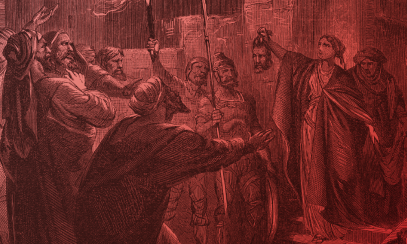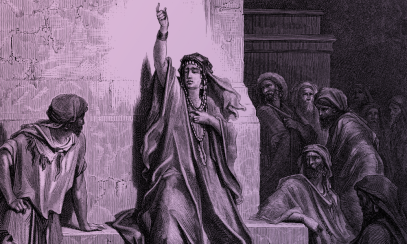
Mercy is Love Transformed
As we continue our year-long reflection on the nature of mercy in honor of the official Jubilee Year of Mercy (Dec. 8, 2015–Nov. 20, 2016), let us recall from last time that, according to Pope St. John Paul II, mercy “signifies a special power of love.” In other words, mercy is really love transformed, so we need to understand what love is if we are to penetrate more deeply into what it means to be merciful.
What is love?
We are all probably familiar with St. Paul’s famous lines in his First Letter to the Corinthians in which he tells us what love is and what it is not:
Love is patient, love is kind. It is not jealous, [love] is not pompous, it is not inflated, it is not quick-tempered, it does not brood over injury, it does not rejoice over wrongdoing but rejoices with truth. It bears all things, believes all things, endures all things. (13:4-7)
In other places, St. Paul refers to divine love as agape. Agape is a proactive searching out for opportunities to love, rather than a mere passive reaction to particular situations with love. Jesus Christ makes it even clearer for us. Throughout the Gospels, we find that whenever someone asks Jesus what love is, they immediately get a task.
What is love? Feed the hungry; clothe the naked; visit the prisoner. What is love? Forgive your brother seven times 70 times. What is love? Go and sell all that you have and come follow me. What is love? Pray for your enemies. What is love? Lay down your life for your friend.
In other words, love requires us to act, for agape is pure action. Love also requires us to die to the self; to deny our very self. Love is other-centered by its very nature. Love is self-giving and self-sacrificing. And God has loved us first.
The loving act of creation
Throughout our tradition, one of the attributes that has been assigned to God the Father is that of omnipotence (all-powerful). We read in the Old Testament how the prophets often approached the Divine with fear and trembling in deference to this power. In fact, so great is the power of the Father that when Moses asked to see the Lord’s glory, God answered, "I will make all my beauty pass before you. ... But my face you cannot see, for no one sees me and still lives." (Ex 33:19-20).
An implication would be that in order for us to exist, then, the Father must withhold or protect us from the sheer power of his being – otherwise, we would be completely consumed. In this way, the Father lovingly exercises this power by constraining rather than asserting it. We might even say that the Father emptied himself out of love, as he is the very nature of Being, so that we might have being. This self-emptying, after all, is intrinsic to any act of creation, whereas self-absorption is the hallmark of acts of destruction. And the Father’s self-giving gift of love was life itself.
From the Incarnation to the cross
Jesus Christ, of course, was and is the Incarnation of God’s love for humanity. The Word of God, the Logos, the Second Person of the Trinity entered into human experience in order to save humanity from sin. And, as we have stated often in these pages, Jesus, “who, though he was in the form of God, did not regard equality with God something to be grasped. Rather he emptied himself, taking the form of a slave, coming in human likeness; and found human in appearance, he humbled himself, becoming obedient to death, even death on a cross.” (Phil 2:6-8)
Love alone can account for this sacrifice of God. Jesus died so that we might be brought to “life with Christ” (Eph 2:5), and share in the divine life of the triune God. Whereas, the Father gave us life, the Son submitted to death so that we might have live more fully with God.
Our response
None of this was for God’s own benefit, as God lacks nothing. Life itself, the possibility of eternal life in communion with God and our ability to live into this communion all flow from the very nature of God who is Love. Love is self-diffusive. That is, it is overflowing and seeks expression in the good of the other. And God, fully in the three persons of the Trinity, faithfully continues to love us first through an ongoing self-emptying.
Now, we, too, are called to do the same; to imitate God’s self-giving love. It is the only proper response, but it is a response that demands everything from us. And yet, it offers eternity in return.
Spiritual Reading
In Misericordiae Vultus, the papal bull establishing the Extraordinary Jubilee, Pope Francis reminds us that we “are called to gaze even more attentively on mercy so that we may become a more effective sign of the Father’s action our lives” during this Year of Mercy. One way we can do this is through spiritual reading – especially the classics of the Catholic spiritual life. Consider a prayerful reading of this book during the Year of Mercy: Confessions by St. Augustine.
Confessions (a.k.a. The Confessions of St. Augustine) is autobiographical and traces St. Augustine’s journey to Christianity. Because of its treatment of St. Augustine’s struggle with immorality, along with his intellectual search for the truth, Confessions is an excellent choice for the Lenten season.



